



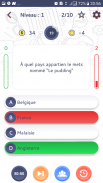
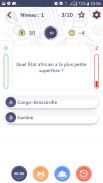
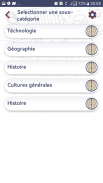
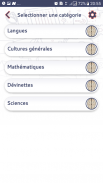

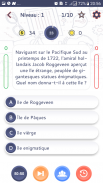

Grand Jeux

Description of Grand Jeux
Grand Games is an intellectual game, designed to allow players to deepen their intellectual knowledge to be prepared for possible recruitment tests. This game is the result of the compilation of the different recruitment tests taken in the world and questions composed by our large team of university assistant (Member in the composition of recruitment tests DRC).
The game consists of two parts. The first allows you to play the desired category and the second is a challenge where the questions are offered randomly.
Game features six test categories currently include: The Riddles, General Culture, The French, The Mathematical Logic, the Professions and Occupations and English. Each category includes at least 150 questions but will be updated after a certain time.
Your scores are saved and you have the opportunity to be published in the Facebook page of the game or even send it to a friend.
What utilities of Psychotechnique tests
There are few more years, the psychometric tests were rarely used for recruiting executives. For many jobs, recruitment firms used logic testing, but for management positions, they were limited to personality tests.
Things have changed today. The overseas companies have introduced their practices and multinationals seeking to unify their recruitment process. It is now common for executives to ask, even from the most prestigious schools, to pass psychometric tests. The practice has also not absurd. The tests verify in any way the value of diplomas, but are intended to evaluate all other capabilities. This is not to assess the knowledge, but the flexibility of mind, the ability to integrate novel thinking codes, or even imagination.
The value of these tests is regularly discussed, but we must believe that they are successful because companies use more than ever. In the future candidate, the question is not there anyway. Tests there, so this is to be the best equipped as possible to succeed.
First step, familiarization with different types of tests. Once the candidate is on familiar ground, it grows in confidence because he knows what is expected of him.
Second step, the drive for testing. In practice, the future candidate records the mechanisms involved in these tests and develops personal techniques to find the solutions.























